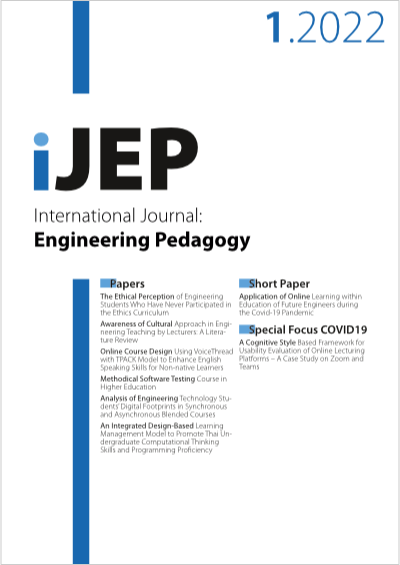A Cognitive Style Based Framework for Usability Evaluation of Online Lecturing Platforms – A Case Study on Zoom and Teams
DOI:
https://doi.org/10.3991/ijep.v12i1.25295Keywords:
Usability Evaluation, Heuristics, Cognitive Styles, e-learning, Higher Education, Online LecturingAbstract
Recently, Zoom and Microsoft Teams have emerged as the most common tools for lecturing activities in higher education institutions. The fact that these platforms were not originally developed for educational purposes resulted in a significant reduction in learning effectiveness, especially in STEM subjects that require a lot of practical knowledge. Despite the enhancements and updates made to these platforms, they have failed to meet the learning effectiveness criteria. A major hindering to learning effectiveness on such systems can be traced not only to the absence of learning-related features but also to their usability. In this research, we propose a framework for evaluating the usability of online lecturing platforms. The proposed framework introduces a new set of heuristics that are specifically designed for lecturing activities and considers VAK learning styles. Since students with different learning styles learn differently, we developed the first cognitive style-based usability heuristics that can reliably assess the usability of online learning environments for various types of learners. We present a case study that uses the suggested evaluation framework to assess the usability of Zoom and Teams in higher education lecturing activities. The findings of this study, however, can be applied to almost any online lecture platform.
Downloads
Published
2022-02-10
How to Cite
Ismail, H., Khelifi, A., & Harous, S. (2022). A Cognitive Style Based Framework for Usability Evaluation of Online Lecturing Platforms – A Case Study on Zoom and Teams. International Journal of Engineering Pedagogy (iJEP), 12(1), pp. 104–122. https://doi.org/10.3991/ijep.v12i1.25295
Issue
Section
Special Focus COVID19
License
Copyright (c) 2021 Heba Ismail, Adel Khelifi Adel Khelifi, Saad Harous

This work is licensed under a Creative Commons Attribution 4.0 International License.


